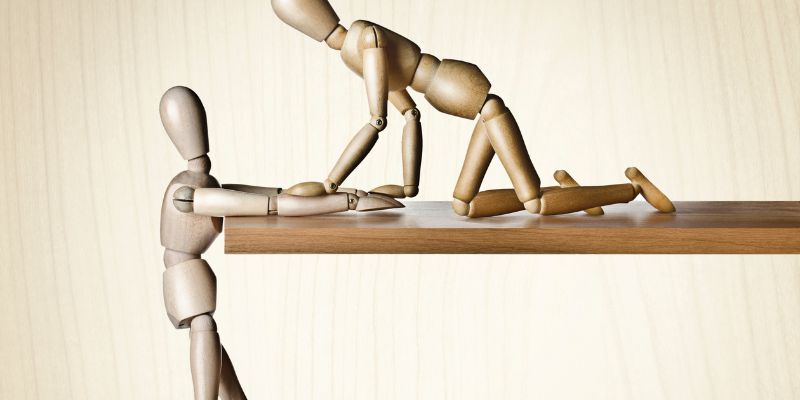As human beings, we are built with the instinct to extend over hands to help others in need; the amount of it may vary from person to person, but it makes us social beings. Still, there must be a balance in how much you can extend your hand or support others.
An individual who helps others to the extent that it neglects their health and puts aside their well-being is not a good sign and creates a problem for them. This particular feeling or habit is categorized as Messiah complex, other terms used to explain this particular feeling are savior complex or white knight syndrome. Although it may not sound like a big deal in many situations, it can be dangerous if not handled carefully.
Having a Messiah complex may develop a feeling that compels you to save others, and you are responsible for helping others beyond your means. It may also be for personal reasons and a part of your strategy to desire praise, prove yourself worthy or exhibit power.
Savior complex is not a medical disease; it's a state of mind that is complex and more prevalent in people with conditions like bipolar disorder, schizophrenia, and delusional disorder.

What makes Savior(Messiah) Complex Complicated?
There is a thin line when you do a thing for your advantage or do service of helping others; the outcome in both cases remains the same, but the intentions behind it are not; that's why it's hard to tell whether a person is doing it due to a savior complex or they have some other motives behind it.
Helping others is no harm; it's fundamentally right, but doing it to a level that may hurt you mentally and physically is completely wrong and unacceptable. Other than that, helping others to gain control, exercise your power, or influence others to achieve something else is also hard to recognize in the beginning until it's done.
Many people take it to the next level. They think they are doing the messianic mission where they are the savior of humanity as taught in the bible. Some many propositions and events make it harder to understand and identify the savior complex.
Symptoms of Savior Complex
Overindulgence in helping other
Humans are social beings, and helping each other's is one of the major parts which makes us human and connected, but helping other, if you over-commit or help beyond your means or jeopardize your mental or physical health, is a serious problem and need immediate preventable action.
A simple example of this phenomenon is people sacrificing their sleep to help others; it's okay if it happens one or two times, but if it's a constant thing, it may result in adverse physical and mental complications after a while.
Seeking validation, praise, self-esteem
Seeking validation, praising others, and craving self-esteem or self-worth are often damaging sometimes if you constantly do it. There is no harm in attaining all of these but seeking them to the extent that you start neglecting yourself physically and mentally, leading to a savior complex.
Individuals with megalomania ( a condition where one thinks their worth is more than the actual is) are potentially more prone to a messiah complex. Megalomania instills an exaggerated sense of self-worth, which is damaging. They think they are more important and that they convert to delusional disorder.
Having a Codependency
Having codependency is also the reason behind the messiah complex; when you start feeling responsible for other persons' needs and no matter what you need to fill those needs, whether positive or negative, your chances of having a savior complex increase significantly.
It is also described as pathological altruism, implying that if you start looking to save people you know, you may also look to save people you don't know.
Eating Disorder
An eating disorder is often linked to developing a messiah complex; according to the expert, people with an eating disorder are more into saving other people, and the chances of them having pathological altruism is higher than normal. It is directly relatable or linked to having a savior complex.
Having Disorders like bipolar, delusional, mental, or schizophrenia
All mental disorders are directly linked to the messiah complex; similarly, with megalomania, people putting themselves above or considering themselves superior to others, they often find it hard to adjust, leading to developing a savior complex.
Ways Savior Complex can harm you
Messiah complex can harm you in many ways, not just mentally but also physically; here are some potential ways that can harm you:
- Suppose you are suffering from a messiah complex. In that case, there is a high chance that you can get hurt by saving someone in a dangerous situation.
- The feeling of not accomplishing saving other people affects you psychologically and puts you in a bad mental state.
- Neglecting yourself and giving preferences to others can cause your illness.
- The main reason that leads to burnout.
- It affects you emotionally, which later starts damaging your relationships.
- Having a messiah complex negatively affects the people you want to help.
Savior Complex and Mental Disorder
People often relate the savior complex to mental disorders. In reality, it's not a mental disorder, but it can trigger other mental illnesses. People with Messiah complex consider themselves a higher being or have more worth than others, which negatively affects their mental health in the long term.
These people find it hard to amend their ways and thought processes, making them more rigid and vulnerable to external elements. Messiah complex is linked to mental disorders, schizophrenia, and bipolar disorder.
Final Thoughts
Savior or Messiah complex is having a desire or urge to help others to such an extent that you may affect your physical or mental health. Although it's not a medical or mental condition, it can lead to delusions, bipolar disorders, and schizophrenia. It harms you in many ways; people with megalomania are more prone to have a savior complex. Bringing balance in your acts is the key to avoiding it; seek therapy and amend your ways.





